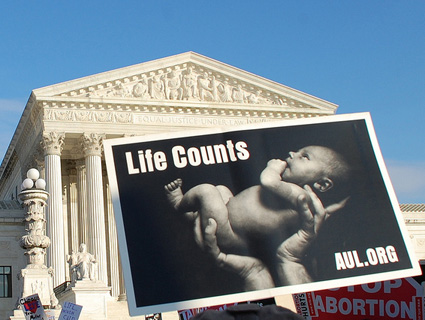House Republicans have dropped some controversial provisions from a bill that would permanently bar federal funding for abortions, but still plan to extend the reach of existing bans to cover tax credits and some deductions, according to a GOP memo [PDF] obtained by Mother Jones on Monday.
The “No Taxpayer Funding for Abortion Act,” sponsored by Rep. Chris Smith (R-N.J.), is designed to ensure that tax dollars do not “pay for, subsidize, encourage, or facilitate abortions,” say the sponsors. But abortion rights groups have argued that the law, also known as H.R. 3, would effectively eliminate private insurance coverage for abortions by creating a strong disincentive for employers and individuals to select plans that cover those services. In turn, they argue, many insurers would likely stop offering abortion services in order to avoid losing customers.
The latest version of the Smith bill drops the attempt to redefine rape that drew considerable criticism last month. But it still makes permanent and government-wide the Hyde Amendment, a provision that has been renewed each year since 1976 that prohibits federal funding of abortions through Medicaid. It also extends that prohibition into the tax code, meaning that employers and individuals could not make use of tax credits for private insurance plans that offer abortion coverage.
H.R. 3 would also bar the use of pre-tax health accounts—like health savings accounts or medical savings accounts—for abortion services. In other words, women would not be able to make use of their own money set aside for medical purposes to obtain an abortion. And self-employed individuals, who can normally deduct medical expenses exceeding 7.5 percent of their adjusted gross income, would no longer be able to deduct the cost of health insurance that covered abortion—even if they never used that coverage.
The bill also bars the tax breaks for small businesses that were made available under last year’s new health care law from being used for any health care plan that covers abortions.
The measure also codifies the so-called “conscience clause,” which bars federal agencies, state or local governments, or any program funded directly or indirectly by the federal government from “discrimination on the basis that the health care entity does not provide, pay for, provide coverage of, or refer for abortions.” It also includes a permanent prohibition on funding for abortion in international aid.
The new version of the bill does, at least, strike references to the “pregnant female” in favor of “woman.” It’s just a language shift, but the latter certainly gives more respect and agency to the woman rather than merely referring to her as a vessel for an unborn child. The new version also clarifies that federal funds can be used for services related to “any infection, injury, disease, or disorder that has been caused by or exacerbated by the performance of an abortion,” after criticism of the previous version raised concerns that it could bar health care providers from covering any and all conditions possibly related to an abortion.
The bill is scheduled for mark-up in the House Committee on the Judiciary at 10:15 a.m. on Wednesday, March 2. (UPDATE: It was moved to 10:00 a.m. on Thursday, March 3.)
This post has been edited since it was first posted.








